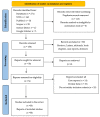A GNAS Gene Mutation's Independent Expression in the Growth of Colorectal Cancer: A Systematic Review and Meta-Analysis
- PMID: 36428574
- PMCID: PMC9688108
- DOI: 10.3390/cancers14225480
A GNAS Gene Mutation's Independent Expression in the Growth of Colorectal Cancer: A Systematic Review and Meta-Analysis
Abstract
Globally, colorectal carcinoma CRC is the third most common cancer and the third most common reason for cancer-associated mortality in both genders. The GNAS mutations are significantly linked with poor prognosis and failed treatment outcomes in CRC. A systematic review and meta-analysis of multiple studies executed following Preferred Reporting Items for Systematic Reviews and Meta-Analysis (PRISMA) criteria and registered with PROSPERO (registration number: CRD42021256452). The initial search includes a total of 271 publications; however, only 30 studies that merit the eligibility criteria were eventually chosen. Data analysis via OpenMeta Analyst and comprehensive meta-analysis 3.0 (CMA 3.0) software were used to investigate the prevalence of GNAS gene mutation among CRC patients. The meta-analysis consisted of 10,689 participants with most being males 6068/10,689 (56.8%). Overall, prevalence of GNAS mutations was 4.8% (95% CI: 3.1−7.3) with I2 = 94.39% and (p < 0.001). In 11/30 studies, the frequency of GNAS gene mutations was majorly in codons R201C [40.7% (95% CI: 29.2−53.2%)] and in codon R201H [39.7% (95% CI = 27.1−53.8)]. Overall prevalence of GNAS mutations was highest among the male gender: 53.9% (95% CI: 48.2−59.5%: I2 = 94.00%, (p < 0.001), tumour location (colon): 50.5% (95% CI: 33.2−67.6%: I2 = 97.93%, (p < 0.001), tumour grade (Well): 57.5% (95% CI: 32.4−79.2%: I2 = 98.10%, (p < 0.001) and tumour late stage: 67.9% (95% CI: 49.7−84.3%: I2 = 98.%, (p < 0.001). When stratified according to study location, a higher prevalence was observed in Japan (26.8%) while Italy has the lowest (0.4%). Overall prevalence of GNAS gene mutations was 4.8% with codons R201C and R201H being the most mutated, and the results conformed with numerous published studies on GNAS mutation.
Keywords: CRC; GNAS gene mutations; colon cancer; colorectal cancer.
Conflict of interest statement
The authors declare no conflict of interest.
Figures





Similar articles
-
A Systematic Review and Meta-analysis on the Occurrence of Biomarker Mutation in Colorectal Cancer among the Asian Population.Biomed Res Int. 2022 Jun 23;2022:5824183. doi: 10.1155/2022/5824183. eCollection 2022. Biomed Res Int. 2022. PMID: 35782059 Free PMC article.
-
Targeted variant prevalence of FBXW7 gene mutation in colorectal carcinoma propagation. The first systematic review and meta-analysis.Heliyon. 2024 May 22;10(11):e31471. doi: 10.1016/j.heliyon.2024.e31471. eCollection 2024 Jun 15. Heliyon. 2024. PMID: 38845996 Free PMC article.
-
A novel GNAS-mutated human induced pluripotent stem cell model for understanding GNAS-mutated tumors.Tumour Biol. 2020 Sep;42(9):1010428320962588. doi: 10.1177/1010428320962588. Tumour Biol. 2020. PMID: 32996421
-
GNAS mutations identify a set of right-sided, RAS mutant, villous colon cancers.PLoS One. 2014 Jan 30;9(1):e87966. doi: 10.1371/journal.pone.0087966. eCollection 2014. PLoS One. 2014. PMID: 24498230 Free PMC article.
-
Prognostic role and clinicopathological features of SMAD4 gene mutation in colorectal cancer: a systematic review and meta-analysis.BMC Gastroenterol. 2021 Jul 23;21(1):297. doi: 10.1186/s12876-021-01864-9. BMC Gastroenterol. 2021. PMID: 34301194 Free PMC article.
Cited by
-
Paired primary-metastasis patient-derived organoids and mouse models identify phenotypic evolution and druggable dependencies of peritoneal metastasis from appendiceal cancer.bioRxiv [Preprint]. 2025 Feb 22:2025.02.17.638725. doi: 10.1101/2025.02.17.638725. bioRxiv. 2025. PMID: 40027618 Free PMC article. Preprint.
-
Spatial immune heterogeneity in a mouse tumor model after immunotherapy.Cancer Sci. 2025 Mar;116(3):622-632. doi: 10.1111/cas.16421. Epub 2024 Dec 3. Cancer Sci. 2025. PMID: 39624899 Free PMC article.
-
Molecular and immunohistochemical markers in appendiceal mucinous neoplasms: A systematic review and comparative analysis with ovarian mucinous neoplasms and colorectal adenocarcinoma.Histol Histopathol. 2025 May;40(5):621-633. doi: 10.14670/HH-18-830. Epub 2024 Oct 10. Histol Histopathol. 2025. PMID: 39743929
-
Combined Aerobic and Resistance Training Improves Body Composition, Alters Cardiometabolic Risk, and Ameliorates Cancer-Related Indicators in Breast Cancer Patients and Survivors with Overweight/Obesity: A Systematic Review and Meta-Analysis of Randomized Controlled Trials.J Sports Sci Med. 2024 Jun 1;23(2):366-395. doi: 10.52082/jssm.2024.366. eCollection 2024 Jun. J Sports Sci Med. 2024. PMID: 38841642 Free PMC article.
-
Famitinib plus camrelizumab in patients with advanced colorectal cancer: Data from a multicenter, basket study.Innovation (Camb). 2025 Jan 6;6(1):100745. doi: 10.1016/j.xinn.2024.100745. eCollection 2025 Jan 6. Innovation (Camb). 2025. PMID: 39872476 Free PMC article.
References
-
- Steffen D.J., Amornphimoltham P., Valera J.L.C., Taylor S., Hunter T., Tamayo P., Gutkind J.S. GNAS-PKA Oncosignaling Network in Colorectal Cancer. FASEB J. 2018;32:695–699. doi: 10.1096/fasebj.2018.32.1_supplement.695.9. - DOI
-
- Ohtsuka T., Tomosugi T., Kimura R., Nakamura S., Miyasaka Y., Nakata K., Mori Y., Morita M., Torata N., Shindo K. Clinical Assessment of the GNAS Mutation Status in Patients with Intraductal Papillary Mucinous Neoplasm of the Pancreas. Surg. Today. 2019;49:887–893. doi: 10.1007/s00595-019-01797-7. - DOI - PubMed
Publication types
Grants and funding
LinkOut - more resources
Full Text Sources

